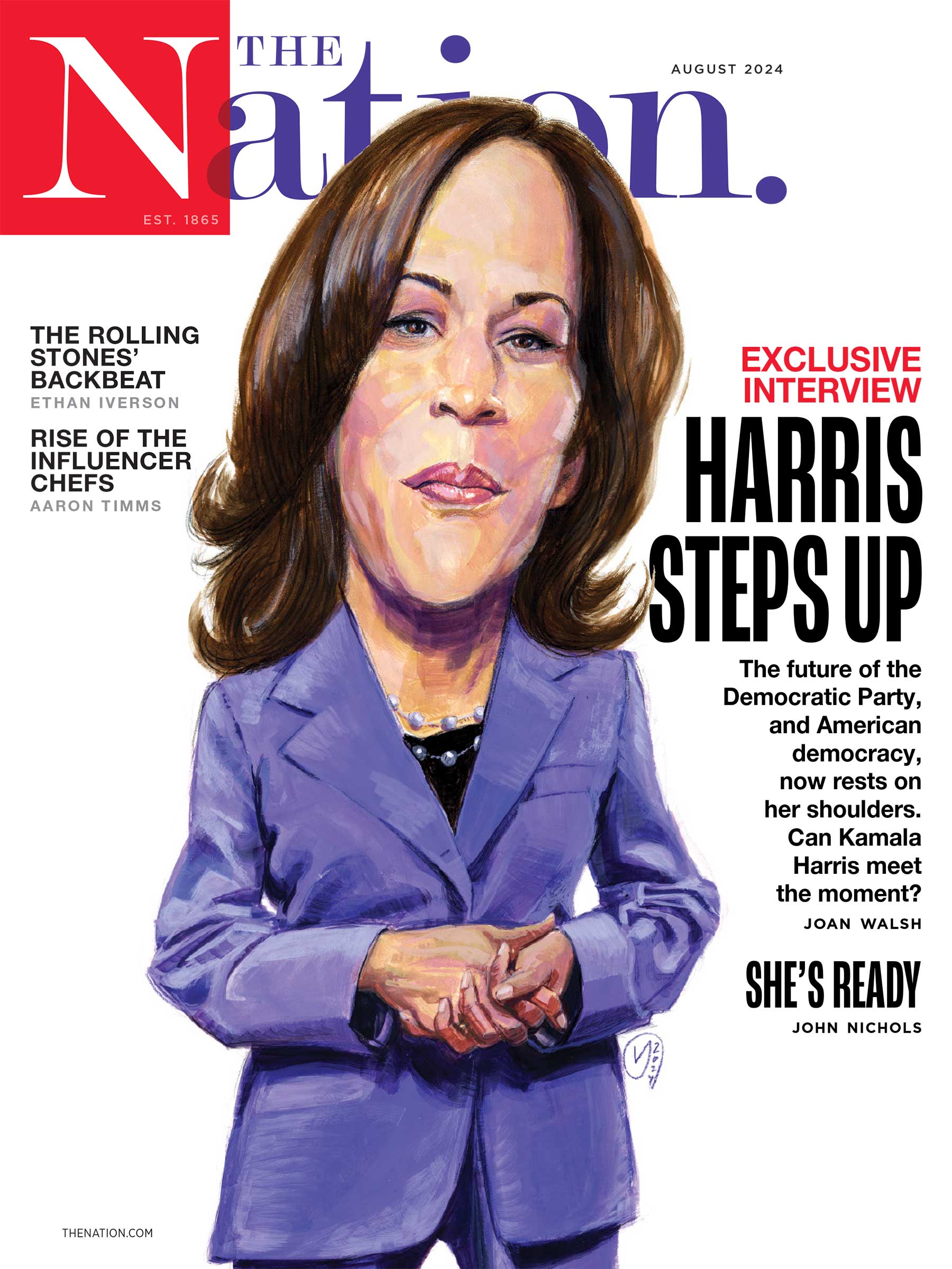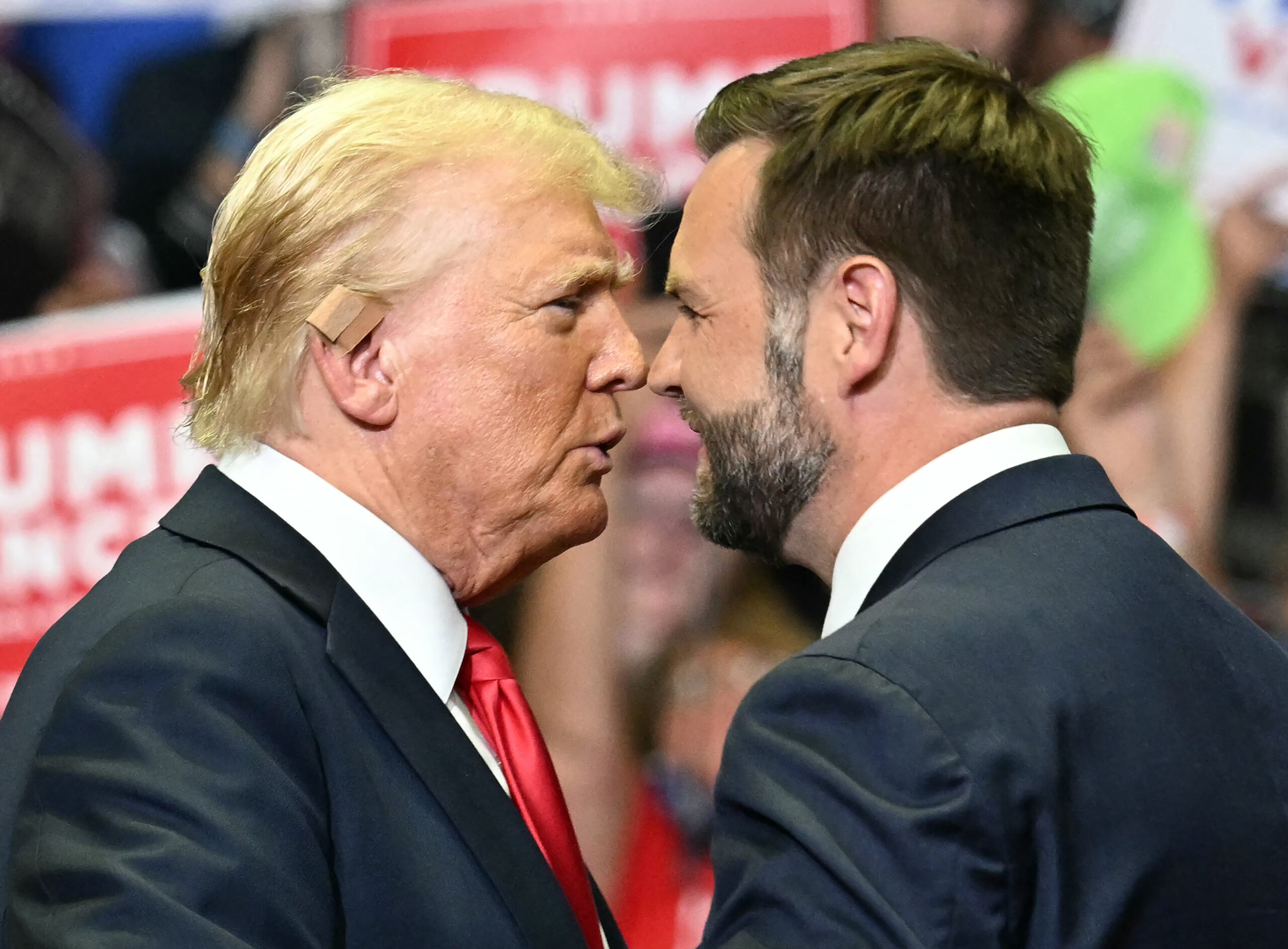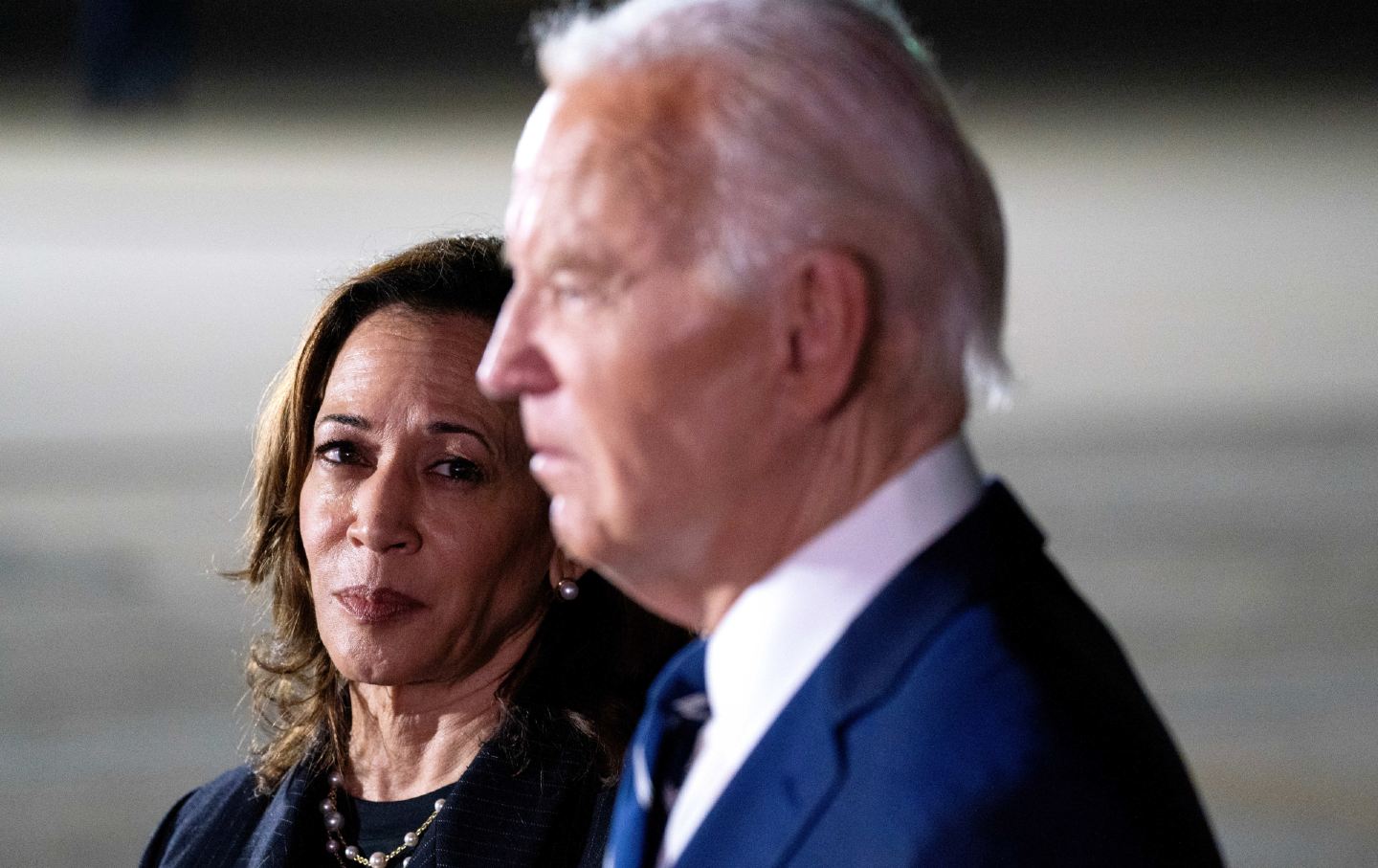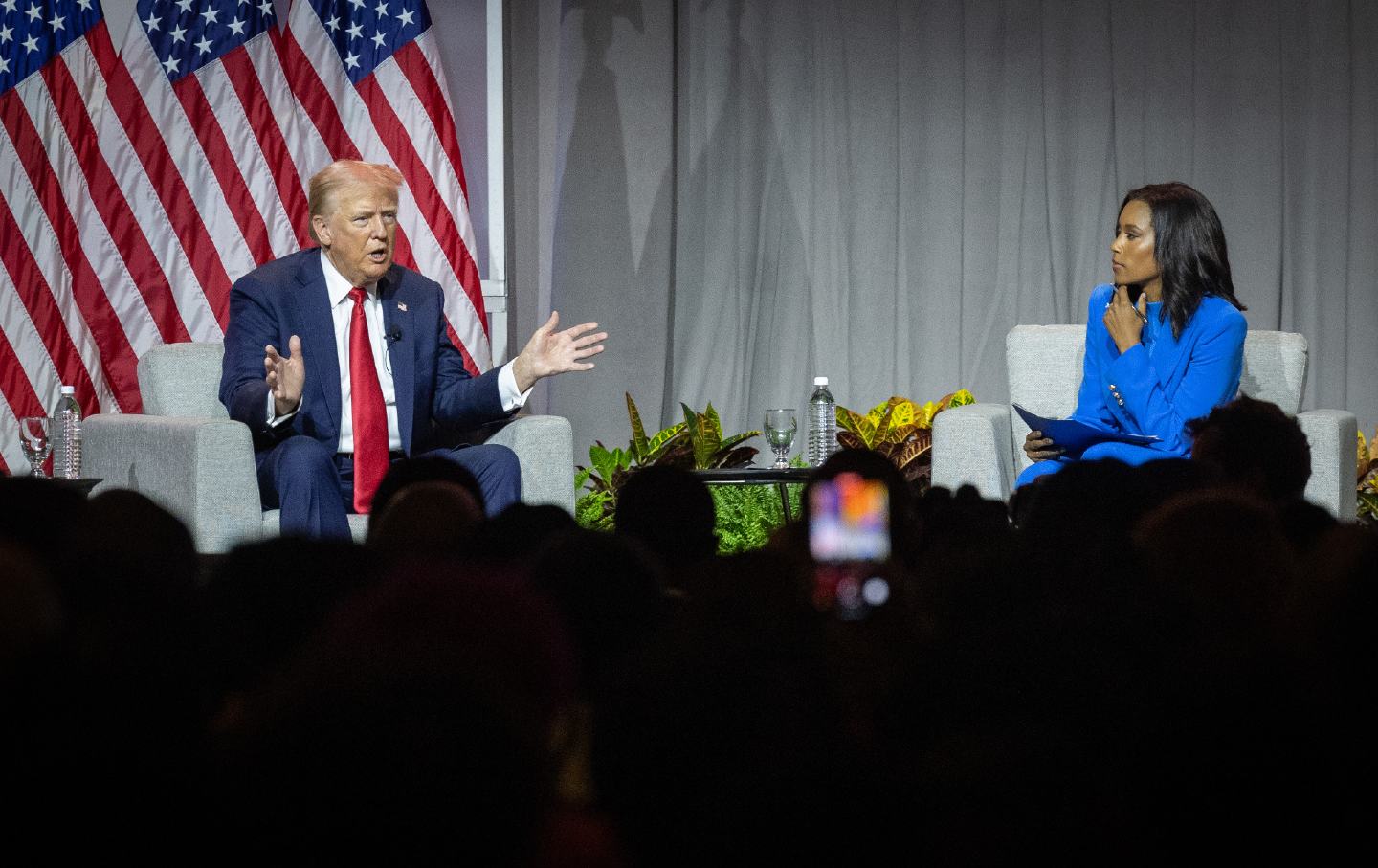The former president is caught in a nostalgia trap of his own making.
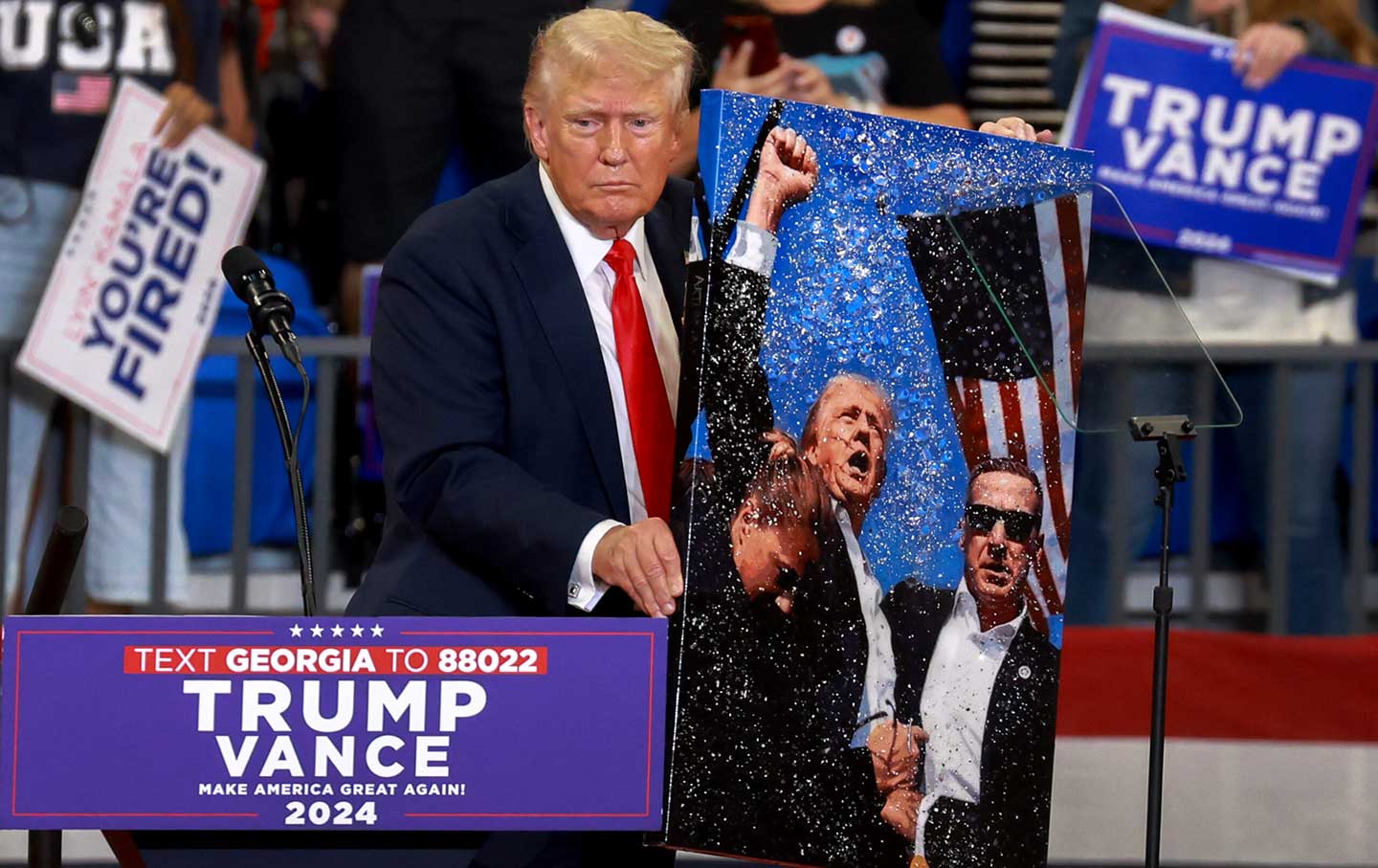
With remarkable speed, the Democratic Party has embraced Kamala Harris as their presumptive nominee and moved on from Joe Biden, the party’s standard-bearer since 2020—who only a month ago was set to run for the fourth time on a presidential ticket. But even as Harris and her vice presidential running mate Tim Walz have reenergized their party with massive crowds and hefty fund-raising hauls, Donald Trump is not ready to give up on the dream of a rematch against the former president. Both in the press conference Trump gave on Thursday at Mar-a-Lago and in his rally the following day in Montana, the former president repeatedly referred to Biden in surprisingly wistful terms, becoming indignant against the supposed injustice of the Democratic Party forcing Biden to withdraw from the race.
Trump even went so far as to claim in his press conference that Biden had been the victim of an unconstitutional coup. Trump said, “I am no Biden fan but from a constitutional standpoint, from any standpoint you look at, they took the presidency away. People say he lost after the debate. I don’t know whether that is true. Whether he could or couldn’t win, he had the right to run.” This is absurd, since no constitutional issues were raised by Biden’s withdrawal as a candidate. Political parties are self-governing entities that set their own rules.
In the Montana rally, Trump launched into an anachronistic riff where he asked the crowd which nickname is better, Sleepy Joe or Crooked Joe. The assembled MAGA cultists roared when “Crooked Joe” was mentioned and—in a plaintive tone that suggested mourning for the campaign he wanted to run against Biden—Trump said, “‘Crooked’ seems to always win. I mean, he’s a crooked guy.”
It’s hard to escape the feeling that Trump would really rather be running against Biden again—or indeed against Hillary Clinton (who also recurs in his speeches with references to her e-mail scandal, an incident that is surely of remote interest in 2024). Trump’s speeches increasingly feel like a nostalgia act, with the demagogue rehearsing his greatest hits (Crooked Hillary’s e-mails, China caused Covid, Defund the Police, Stop the Steal) rather than engaging in the political battles of the moment. This constant regurgitation of old material has made Trump’s speeches even more unfocused and digressive, lacking in strong attack lines. He’s never been a disciplined speaker, but at his best, in the 2016 campaign, he was able to hammer at his foes (both establishment Republicans in the primary and Hillary Clinton in the general election, with punchy polemical jabs.
To get a taste of how meandering Trump has become, consider this extended wail from the Montana rally, taking up his now familiar complaint about Biden’s withdrawal:
“After the debate [Biden] was down, way down, in the polls. They didn’t even want to show the polls. They said that he’s not going to win. So they said, ‘We’re going to take him out and we’re going to put somebody new in.’ This never happened to anybody before. You spend—we spent $100 million dollars fighting crooked Joe Biden and then all of sudden they’ve decided to take him out and put somebody else in. [Harris] never got one vote. She was the first loser in the primaries. You know she ran against Joe Biden and everyone else. I think they had like 16 people running. She never made Iowa, the first state. I love Iowa. You know why I love it? Because I win it every single time with the farmers. We win it. But he never made Iowa. She was the first one to quit. And now… and stupid. Honestly she was the nastiest to him too. And then he picked her. I couldn’t believe it. She was part of the cabal that got him out. You know, they got him out. They said, ‘We’ll do it the nice way or we’ll do it the hard way, Joe. We’ll use the 25th Amendment, and we’ll call you mentally incompetent and everybody will believe us.’ And you know what they did is… a terrible thing, actually. They forced him out. It was a coup. We had a coup. That was the first coup in the history of our country. And it was very successful. He said, ‘OK, I’ll leave. If that’s what you want, I’ll leave.’ And now he’s seeing what the competition is. I hear he’s going to make a comeback at the Democrat convention. He’s going to walk into the room and he’s going to say, ‘I want my presidency back. I want another chance to debate Trump. I want another chance.’”
As so often with Trump, much of this is phantasmagoric wishcasting disguised as political argument. It’s hardly a coup if Joe Biden is still president. There is no evidence that Biden was threatened with the 25th Amendment (a move that would in fact have torn the Democratic Party apart) or that Biden has any plans to use the Democratic National Convention to regain the nomination. The underlying impulse is clearly Trump’s transparent desire to have Biden, rather than Harris, as his rival in the election.
There is no mystery as to why Trump is indulging in this public daydreaming: The Kamala Harris and Tim Walz ticket has made the election, which Trump was on track to win, competitive again.
As Axios reports, the Trump campaign is worried that Harris is taking the lead in the election and their candidate lacks the focus to make her the center of his attack. This worry is grounded in the fact that Harris has taken the lead in multiple national polls, is now leading in the swing states of the Midwest (Wisconsin, Michigan, and Pennsylvania), and is more competitive than Biden in the swing states of the South and Southwest (Georgia, North Carolina, Arizona, and Nevada), where the race is now tightening. While the race remains very close, Harris has a real shot at a decisive popular and Electoral College victory.
According to Axios, Trump’s advisers are “pleading with him to adopt a new ‘hard-hitting’ stump speech to define Vice President Harris as liberal and weak…. And praying he’ll stop the recidivistic pull to simply improvise haphazardly.”
Trump did in fact make arguments in his press conference and speech that Harris is too liberal, in particular referencing stances she took in the 2019 presidential bid, which she has since disavowed (support for Medicare for All and opposition to fracking). But such attacks are generic and can apply to many other Democrats. In the past, Trump was able to characterize his foes in memorable ways with nicknames that had the power to stick (Little Marco, Crooked Hillary, Sleepy Joe). When it comes to Harris and Walz, Trump is still struggling to define them in any language beyond that of GOP boilerplate rhetoric, which may convince the base but finds little resonance with the disengaged voters Trump so successfully mobilized with his original political campaign.
Trump 2024 is a very different candidate than he was in 2016, when he upturned American politics. However disgusting Trump’s demagoguery and racism were, he was an electrifying presence who had a compelling message: that America was governed by a bipartisan elite with globalist values whose preferred policies (free trade, robust immigration, an internationalist foreign policy that led to numerous wars) was bad for the country. To this supposed consensus, Trump presented himself as an outsider who, because of his wealth, could challenge the status quo. This message was largely a work of fiction (Trump’s wealth was vastly overstated, and he effectively governed as a conventional Republican, aside from his heterodoxy on trade), but it made for a strong sales pitch.
Trump in 2024 is both an older candidate and a more tired one. His current campaign is a rerun rather than a burst of originality. Symptomatic of this tiredness is his repeated deployment of old talking points and nicknames and his nursing of grudges from his 2020 election defeat (including his insistence that the election was stolen from him and that those arrested for attacking the Capitol on January 6 are victims of legal injustice).
Occasionally Trump advocates some new policy (such as removing taxes on tips—a proposal Kamala Harris has co-opted). But none of these policies challenge the status quo the way Trump’s 2016 campaign did. Trump is running a nostalgia campaign that appeals to those who have fond memories of his presidency. While this remains a significant chunk of the electorate, it isn’t one that is likely to grow his support.
And as a nostalgia act, Trump risks being constantly upstaged by the hot new thing. In recent public appearances, he’s repeatedly overstated the size of crowds at his rally, while also falsely suggesting that Kamala Harris is drawing small crowds. On Sunday, Trump falsely claimed that a photo showing a large crowd greeting Kamala Harris at a Detroit airport was an AI-generated fake. These desperate lies are signs that Trump himself is aware that on some level that he’s facing a formidable rival—and is falling behind. The election is still more than 80 days away and the dynamic could quickly shift. But without a change in message, Trump’s campaign runs the real danger of sputtering along into irrelevance.
Popular
“swipe left below to view more authors”Swipe →
Can we count on you?
In the coming election, the fate of our democracy and fundamental civil rights are on the ballot. The conservative architects of Project 2025 are scheming to institutionalize Donald Trump’s authoritarian vision across all levels of government if he should win.
We’ve already seen events that fill us with both dread and cautious optimism—throughout it all, The Nation has been a bulwark against misinformation and an advocate for bold, principled perspectives. Our dedicated writers have sat down with Kamala Harris and Bernie Sanders for interviews, unpacked the shallow right-wing populist appeals of J.D. Vance, and debated the pathway for a Democratic victory in November.
Stories like these and the one you just read are vital at this critical juncture in our country’s history. Now more than ever, we need clear-eyed and deeply reported independent journalism to make sense of the headlines and sort fact from fiction. Donate today and join our 160-year legacy of speaking truth to power and uplifting the voices of grassroots advocates.
Throughout 2024 and what is likely the defining election of our lifetimes, we need your support to continue publishing the insightful journalism you rely on.
Thank you,
The Editors of The Nation
More from
Jeet Heer 
Jeet Heer




